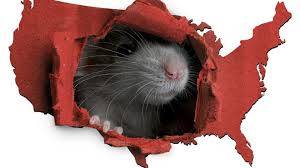Chicago Crowned 'Rattiest City' in America for 10th Consecutive Year.
Chicago, often celebrated for its rich history, diverse culture, and stunning architecture, has recently garnered an unwelcome title: the 'rattiest city' in America. According to the annual report by pest control company Orkin, the Windy City has claimed this dubious honor for the tenth consecutive year, sparking conversations about urban living conditions and pest control measures.
A Growing Problem
The rise of rat populations in urban areas is not just a Chicago-specific issue; it reflects broader trends in cities across the United States. Factors contributing to this phenomenon include rising temperatures, increased construction activities, and, most significantly, food availability. In cities like Chicago, where restaurants, cafes, and food festivals abound, rats find ample sources of food, making the city an attractive habitat.
The city's unique geography, with its extensive parks, river systems, and dense urban environment, further complicates efforts to control the rat population. The combination of these elements creates ideal conditions for rats to thrive, prompting city officials and residents to seek effective solutions.
Community and City Response
In response to the growing rat population, Chicago has implemented several initiatives aimed at tackling the issue. The city's Department of Streets and Sanitation has ramped up its rodent control efforts, which include regular inspections, baiting programs, and community education on proper waste disposal. Residents are encouraged to secure their trash, remove standing water, and eliminate any potential food sources that may attract rodents.
Moreover, the city has launched awareness campaigns to educate the public about the importance of sanitation and proactive measures in preventing rat infestations. Residents are urged to report sightings and actively participate in maintaining clean neighborhoods, as community involvement is crucial in addressing this pervasive problem.
Economic and Health Implications
The implications of a rat infestation extend beyond mere aesthetics; they also pose serious health risks. Rats are known carriers of diseases that can affect humans, such as hantavirus, leptospirosis, and salmonella. Additionally, their presence can deter tourism and impact local businesses. The negative perception associated with a city known for a significant rat problem can influence potential visitors and new residents, leading to economic consequences.
Businesses, particularly in the food and hospitality sectors, have a vested interest in maintaining a clean environment. The presence of rats can lead to health code violations, impacting restaurant ratings and potentially resulting in closures. As a result, many business owners are taking proactive steps to address pest control, recognizing the importance of a clean and safe environment for both customers and staff.
Looking Ahead
While the title of 'rattiest city' may seem like a badge of dishonor, it has prompted Chicagoans to take action. City officials are committed to reducing the rat population and improving public health through various strategies. Innovative approaches, such as using technology to track rodent hotspots and deploying advanced pest control techniques, are being explored.
As Chicago continues to grapple with this challenge, it serves as a reminder of the importance of urban planning, sanitation, and community involvement. The city’s resilience and dedication to improvement highlight the potential for change, even in the face of longstanding issues.
In conclusion, while being crowned the 'rattiest city' for a decade is undoubtedly concerning, it has also ignited a commitment among residents and officials to confront the problem head-on. By working together, Chicagoans can strive to reclaim their city's reputation, turning this challenge into an opportunity for a cleaner, healthier urban environment.


